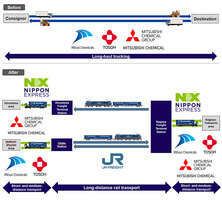- The demonstration test runs from August 2025 to January 2026.
- 82 members, including 81 companies and 1 university, are involved.
- A 34% shortfall in truck transport capacity is expected by 2030.
- Previous tests improved truck loading by 20% and cut CO2 emissions by 28%.

Overview
The Chemicals Working Group, part of the Physical Internet Realization Council, is conducting a demonstration test to enhance logistics in the Tokai and Chugoku regions. This initiative, supported by METI and MLIT, aims to establish collaborative rail transport for chemicals.
Timeline and Participants
The test will run from August 2025 to January 2026. It involves 82 members, including 81 companies and 1 university, with participation from industry associations and government bodies.
Logistics Challenges
Japan's chemical industry faces a significant logistics challenge, with a projected 34% shortfall in truck transport capacity by 2030. The unique nature of chemical cargo requires diverse transport methods, which individual companies struggle to optimize.
Previous and Current Initiatives
A prior test in FY2024 improved truck loading rates by 20% and reduced CO2 emissions by 28%. The current test focuses on using 31-foot containers for rail transport, aiming to shift from truck to rail, reduce emissions, and improve transport efficiency.
Future Goals
The initiative seeks to create a standard scheme for collaborative logistics, enhancing transport capacity and efficiency. Future efforts will explore further modal shifts, logistics cooperation, and standardization to improve overall logistics efficiency.

